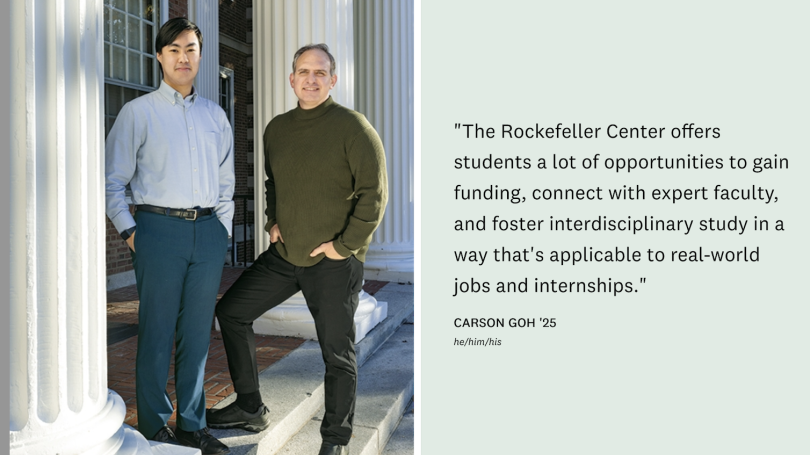
- Public Policy
- Leadership
- Funding
- News & Events
- About the Center
Back to Top Nav
Back to Top Nav
Back to Top Nav
Back to Top Nav
Carson Goh '25 and Jason Barabas '93 have been researching a wide spectrum of topics within American politics. Professor Barabas, an expert in political knowledge, deliberation, public policy, and democratic performance, is the director of the Nelson A. Rockefeller Center for Public Policy and the Social Sciences. Colloquially known as "Rocky," the Center is Dartmouth's hub for students, faculty, and staff engaged in policy research and teaching.
Carson
Growing up in New Hampshire, I was interested in learning how redistricting—the process of drawing electoral district boundaries—is done in this very politically active state. Specifically, I'm passionate about studying how independent redistricting commissions impact minority representation. So, while taking Professor Barabas' class Polling, Public Opinion, and Public Policy my first-year fall, I approached him about my deep interest in polling and data, and he brought me on as a research assistant.
Professor Barabas
First of all, Carson is being modest here—he did really well in the class. He's a great example of how Dartmouth undergraduates can get involved with topics that really interest them. He absorbed the lessons, understood the techniques, and has been able to apply them in our research projects, in other courses, and most recently, through two major scholarships that he's won to pursue collaborative research.
Professor Barabas
We're studying how a candidate's age impacts public support for that person in office. A couple years back, one of my students did an honors thesis on retirements in the Senate, and that got me thinking about why people voluntarily step aside. Age is often a factor in those kinds of decisions. It's fascinating that in the United States, we have age minimums for candidates seeking federal offices, but we don't have maximums. So that led to the question: Should we have mandatory retirement ages? If so, what should those be? There are a lot of competing factors and ethical implications here, like ageism and increases in the average lifespan.
Carson
The Rockefeller Center offers students a lot of opportunities to gain funding, connect with expert faculty, and foster interdisciplinary study in a way that's applicable to real-world jobs and internships. For example, I interned at the New Hampshire Supreme Court last winter with the support of Rocky.
Professor Barabas
Many years ago, my own honors thesis in the government department was supported by the Rockefeller Center. Rocky also hosts speakers from all sides of the political spectrum, sponsors fellowship programs based in Washington, D.C. and abroad, offers leadership training courses, and houses Dartmouth's public policy minor.
Professor Barabas
Within a liberal arts college, students take classes in many different fields. I see a lot of students who are able to apply what they've learned in one area to another.
Carson
Absolutely. I took a South Asian art class this past term and learned about the history of the political systems in the region. It was really interesting to see that connection through a class that I didn't expect to take when I started at Dartmouth.
Carson
I hope to go to law school after graduation. Dartmouth fosters students who are interested in giving back to their communities and making change in the world through public service, and that's where I see myself. If you're a student who values close partnerships with professors and small classrooms where you feel free to speak up, then Dartmouth is the place for you.
Read the article in 3D Magazine here.